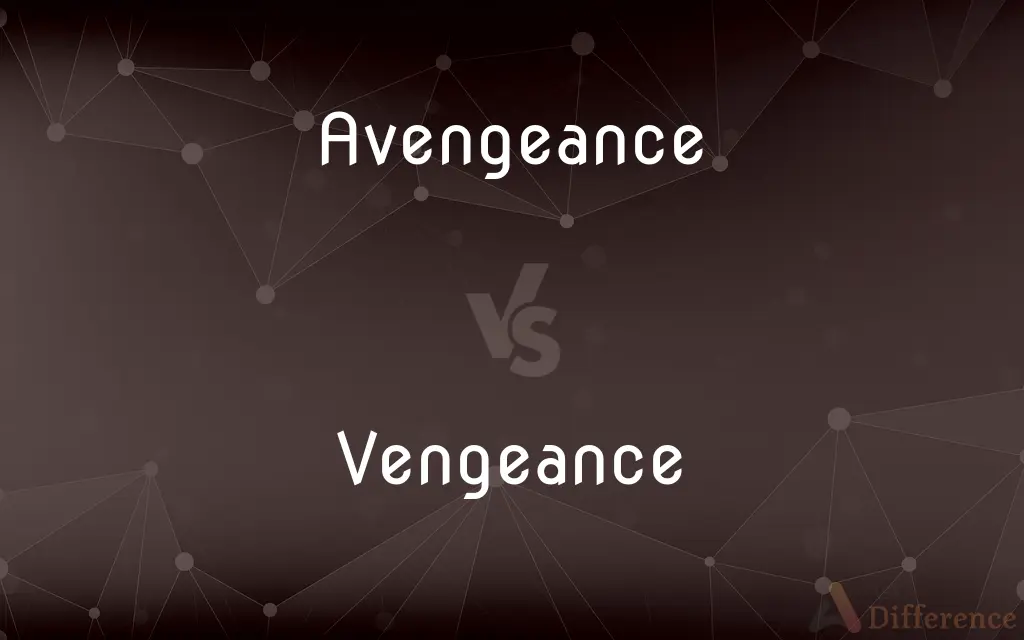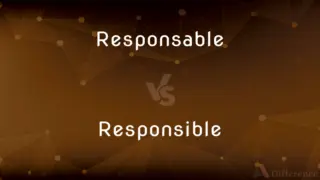Avengeance vs. Vengeance — Which is Correct Spelling?
Edited by Tayyaba Rehman — By Fiza Rafique — Updated on April 17, 2024
"Avengeance" is the incorrect spelling of "vengeance." "Vengeance" refers to punishment inflicted or retribution exacted for an injury or wrong.

Table of Contents
Which is correct: Avengeance or Vengeance
How to spell Vengeance?

Avengeance
Incorrect Spelling

Vengeance
Correct Spelling
ADVERTISEMENT
Key Differences
Remember that "vengeance" is the correct term, with its roots in Latin "vindicare," meaning to claim or avenge.
"Vengeance" ends in "-ance," indicating a state or quality of action, which fits its meaning related to retaliatory actions.
Misremembering "avenge" and "vengeance" can lead to the incorrect "avengeance." "Avenge" is a verb, and "vengeance" is the noun form of getting retribution.
How Do You Spell Vengeance Correctly?
Incorrect: Their act of avengeance was swift and brutal.
Correct: Their act of vengeance was swift and brutal.
Incorrect: She plotted avengeance against those who betrayed her.
Correct: She plotted vengeance against those who betrayed her.
ADVERTISEMENT
Incorrect: The story revolved around a quest for avengeance.
Correct: The story revolved around a quest for vengeance.
Incorrect: The hero’s avengeance satisfied movie viewers.
Correct: The hero’s vengeance satisfied movie viewers.
Incorrect: He promised avengeance for the wrongdoing.
Correct: He promised vengeance for the wrongdoing.
Vengeance Definitions
Punishment inflicted in retaliation for an injury or offense.
He sought vengeance against those who wronged him.
An opportunity to exact punishment or satisfaction from a previous mishap.
Winning the championship was their team's form of vengeance.
A forceful response to an insult or injury.
She struck back with fierce vengeance.
The act of retaliating in order to get even.
Vengeance motivated her actions throughout the story.
A severe or retributive quality of action.
The final scene of the play was full of vengeance.
Punishment inflicted or retribution exacted for an injury or wrong
Voters are ready to wreak vengeance on all politicians
Infliction of punishment in return for a wrong committed; retribution.
Revenge taken for an insult, injury, or other wrong.
Desire for revenge.
Punishment inflicted in return for an injury or an offense; retribution; - often, in a bad sense, passionate or unrestrained revenge.
To me belongeth vengeance and recompense.
To execute fierce vengeance on his foes.
Harm; mischief.
The act of taking revenge (harming someone in retaliation for something harmful that they have done) especially in the next life;
Vengeance is mine; I will repay, saith the Lord
For vengeance I would do nothing. This nation is too great to look for mere revenge
He swore vengeance on the man who betrayed him
The swiftness of divine retribution
Vengeance Meaning in a Sentence
The plot revolves around his vengeance for the betrayal.
She took vengeance on the villains who harmed her family.
They vowed vengeance after the attack.
He carried out his vengeance with cold precision.
The community's vengeance was swift and decisive.
Her character is defined by her pursuit of vengeance.
The king sought vengeance against the neighboring kingdom.
Vengeance drove her to defy the empire.
In the world of politics, vengeance can often backfire.
They debated whether seeking vengeance was worth the cost.
His feelings of vengeance faded as he found peace.
The movie ended with a dramatic act of vengeance.
His quest for vengeance led him down a dark path.
Her writing often explores themes of vengeance and justice.
She used the law to seek vengeance.
They formed a pact sworn on vengeance.
The story of his vengeance captivated the audience.
The poem described ancient warriors’ acts of vengeance.
She paid back his betrayal in vengeance.
Vengeance is a common theme in epic tales.
Vengeance can often lead to a vicious cycle of violence.
The villagers’ vengeance against the corrupt leader was inevitable.
Vengeance was the motive behind the crime.
Vengeance often harms the avenger as much as the target.
The hero’s vengeance was fulfilled by the story's end.
Vengeance Idioms & Phrases
With a vengeance
With great force or effort; more intense than before.
He returned to the competition with a vengeance.
Take vengeance on
To retaliate against someone.
He took vengeance on his enemies.
Spirit of vengeance
A mood or motivating force that drives one to seek retribution.
The spirit of vengeance consumed him.
Path of vengeance
The course of action taken with the intent to retaliate.
She followed a path of vengeance that led her astray.
Vengeance sought
Describes an active pursuit of revenge.
Vengeance sought can lead to unending conflicts.
Cry for vengeance
A loud demand or call for retaliation against wrongs.
The speeches were a cry for vengeance.
Vengeance is mine
A biblical reference, often used to mean that retribution should be left to God.
Vengeance is mine, I will repay, says the Lord.
Fulfill one's vengeance
To achieve the desired revenge.
She did everything to fulfill her vengeance.
Beyond vengeance
Describes actions or a state that surpasses mere revenge.
His actions were beyond vengeance, aiming for justice.
Vengeance unleashed
When retributive actions are fully expressed without restraint.
With the verdict, vengeance was unleashed.
Tool of vengeance
Something used specifically to exact punishment or inflict harm in retaliation.
The scandal was used as a tool of vengeance.
Act of vengeance
A specific deed done to retaliate.
The destruction was an act of vengeance.
Wheels of vengeance
The ongoing process or efforts to achieve revenge.
The wheels of vengeance turn slowly but surely.
No vengeance
A decision or situation where no retaliation occurs.
They chose a path of forgiveness, no vengeance.
Seek vengeance
To actively look for ways to retaliate.
They set out to seek vengeance.
Live for vengeance
To be primarily motivated by the desire to retaliate.
He seemed to live for vengeance.
Serve vengeance
To deliver punishment as retaliation.
He served vengeance upon those who betrayed him.
Taste of vengeance
Experiencing satisfaction from retaliating.
He finally had a taste of vengeance.
Era of vengeance
A period characterized by widespread retributive justice or revenge.
The novel is set in an era of vengeance.
Legacy of vengeance
The long-term effects or traditions stemming from acts of revenge.
The feud left a legacy of vengeance.
Common Curiosities
How many syllables are in vengeance?
Vengeance has two syllables.
What is a stressed syllable in vengeance?
The stressed syllable in vengeance is the first one, "ven".
How is vengeance used in a sentence?
Vengeance is used as a noun to refer to the act of punishing or exacting retribution for a wrong.
What is the pronunciation of vengeance?
Vengeance is pronounced as /ˈvɛn.dʒəns/.
How do we divide vengeance into syllables?
We divide vengeance into syllables like this: ven-geance.
What is the root word of vengeance?
The root word of vengeance is vindicta, the Latin word for revenge.
Why is it called vengeance?
Vengeance is called so because it comes from the Latin word vindicta, which means punishment or revenge, reflecting its meaning of exacting retribution.
What part of speech is vengeance?
Vengeance is a noun.
What is the opposite of vengeance?
The opposite of vengeance could be "forgiveness" or "mercy".
Is vengeance an abstract noun?
Yes, vengeance is an abstract noun as it refers to a concept or idea rather than a physical object.
What is the plural form of vengeance?
The plural form of vengeance is "vengeances".
Is the word vengeance Gerund?
No, vengeance is a noun and not a gerund.
What is the verb form of vengeance?
Vengeance is a noun; it does not have a verb form.
Is vengeance a vowel or consonant?
Vengeance is a word, not a vowel or consonant.
Is vengeance a collective noun?
No, vengeance is not typically used as a collective noun.
What is another term for vengeance?
Another term for vengeance is "retribution".
Is vengeance an adverb?
No, vengeance is not an adverb; it is a noun.
Is the vengeance term a metaphor?
Vengeance can be used metaphorically to describe severe actions or feelings in response to a wrong.
Which conjunction is used with vengeance?
Conjunctions such as "and" or "but" can be used to connect clauses involving vengeance.
Which article is used with vengeance?
The definite article "the" or the indefinite article "a" can be used with vengeance depending on the context.
Is vengeance a noun or adjective?
Vengeance is a noun.
Is vengeance a countable noun?
Yes, vengeance is a countable noun; you can have instances of vengeance.
Which determiner is used with vengeance?
Determiners such as "a," "the," or "some" can be used with vengeance, depending on the context.
Which vowel is used before vengeance?
The vowel used before vengeance depends on the preceding word; there is no specific rule.
Which preposition is used with vengeance?
Common prepositions used with vengeance include "for" and "with."
What is the singular form of vengeance?
The singular form of vengeance is "vengeance".
Is vengeance a negative or positive word?
Vengeance generally has a negative connotation as it involves retaliatory action that can perpetuate conflict.
Is the word vengeance imperative?
No, vengeance is a noun and cannot be used in the imperative mood.
Is the word “vengeance” a Direct object or an Indirect object?
Vengeance can be a direct object in sentences like "He sought vengeance."
Share Your Discovery

Previous Comparison
Pikinini vs. Pickaninny
Next Comparison
Responsable vs. ResponsibleAuthor Spotlight
Written by
Fiza RafiqueFiza Rafique is a skilled content writer at AskDifference.com, where she meticulously refines and enhances written pieces. Drawing from her vast editorial expertise, Fiza ensures clarity, accuracy, and precision in every article. Passionate about language, she continually seeks to elevate the quality of content for readers worldwide.
Edited by
Tayyaba RehmanTayyaba Rehman is a distinguished writer, currently serving as a primary contributor to askdifference.com. As a researcher in semantics and etymology, Tayyaba's passion for the complexity of languages and their distinctions has found a perfect home on the platform. Tayyaba delves into the intricacies of language, distinguishing between commonly confused words and phrases, thereby providing clarity for readers worldwide.














































